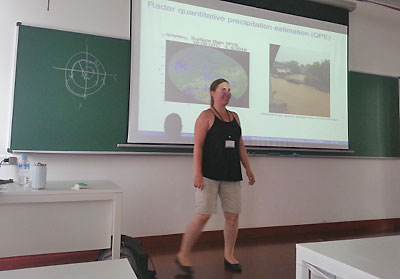|
|
CAM-IMUVA -
Summer School on Uncertainty Quantification for Applied Problems
This July I took part in the "BCAM-IMUVA Summer School on Uncertainty Quantification for Applied Problems". The Summer School was held form July 4th to July 7th in Bilbao, on behalf of the Basque Center for Applied Mathematics (BCAM).
Altogether there were about 40 participants from various countries. Our group, predominantly mathematicians, consisted of both PhD students and PostDocs.
Throughout the four days we had four different lectures, given by Prof. Olivier Talagrand (Laboratoire de Météorologie Dynamique, Paris), Prof. Peter Jan van Leeuwen (University of Reading), Prof. Max Gunzburger (Florida State University) and Dr. Michael Betancourt (University of Warwick). Together they gave a very coherent account of the numerical and theoretical aspects of Uncertainty Quantification.
In particular, we learned a lot about Data Assimilation. I especially liked the lectures about particle filters (=Sequential Monte Carlo methods), where we got a detailed understanding on this class of methods, its drawbacks and the work that is being done to find remedies for the high-dimensional application of particle filters.
Also very interesting were the lectures about Hamiltonian Monte Carlo, which is based on the idea of designing efficient proposal distributions. In this context, Michael Betancourt also talked about the Stan package for Bayesian modeling. It was helpful to learn about this software because I am also programming a Bayesian model and now have the possibility to use Stan to compare against my results. The lecture also included many very descriptive examples and practical remarks on the usage of Markov Chain Monte Carlo methods.
I liked how the lectures - held in this quick succession in a compressed amount of time - contrasted the various methods one typically encounters in the broad area of Uncertainty Quantification. This way, one could get a good grip on which approaches there are for a certain type of problem and their differences and advantages.
Between the courses, short talks from some of the participants were included. I also had the opportunity to give a talk myself, which was titled "Bayesian inverse modeling for quantitative precipitation estimation".
My project has a focus on the quantification of the uncertainties in precipitation estimates, so it fit in well. I got interesting questions and also had the impression that the fellow participants found my project interesting.
In conclusion, the summer school was very interesting and useful - also in terms of gaining experience in presenting and discussing my work in the research community.
Since the BCAM organizers seemed to be very motivated to arrange a worthwhile program, I would also recommend going there for future Summer Schools to other IRTG graduate students.
Article by Katharina Schinagl











